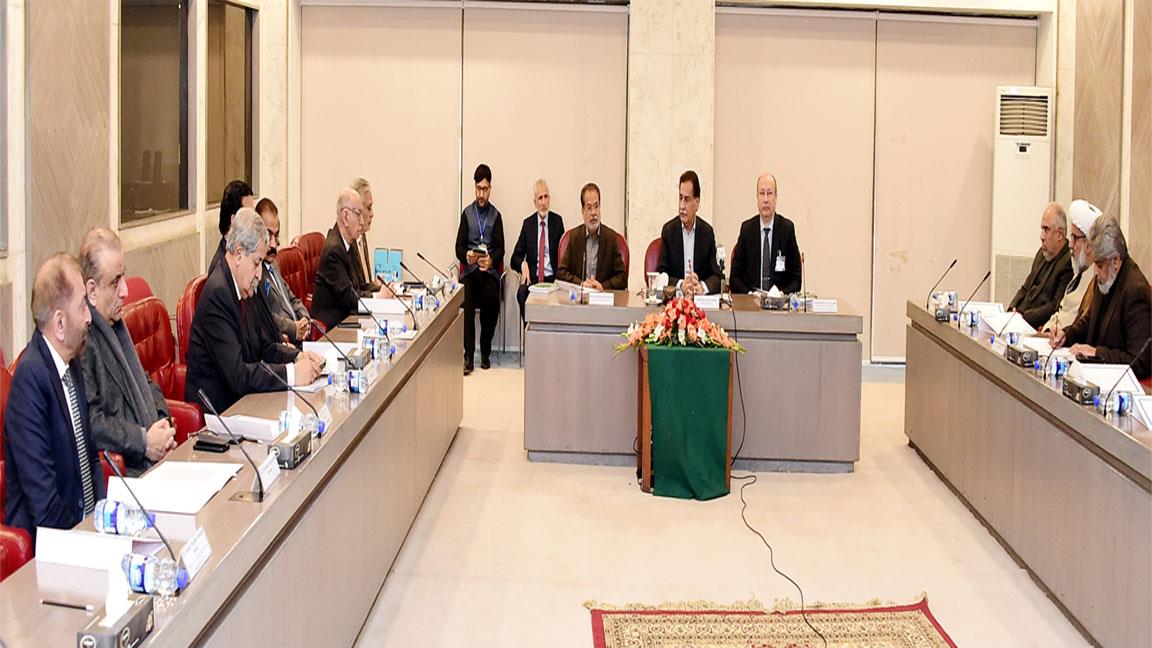
Negotiations In Deadlock: The Complex Dynamics Between Government And PTI
These included forming separate judicial commissions to investigate the events of May 9 and November 24–27, along with the release of political prisoners. However, PTI's longstanding demand for reclaiming its mandate after the February 8, 2024 elections was notably absent.
Government to Respond Within Seven DaysFollowing the session, a joint statement revealed that the government committee would respond in writing to PTI's demands within seven days. During this period, the seven political parties represented in the government committee are to consult their leadership and legal teams to present a unified stance to PTI.
Government Dismisses PTI's DemandsAddressing the media post-meeting, government committee spokesperson Senator Irfan Siddiqui and Adviser to Prime Minister Rana Sanaullah dismissed PTI's demands as baseless. Federal Minister for Information and Broadcasting Ataullah Tarar reiterated on a television talk show that no commission would be formed in response to PTI's demands.
A Major Blow: Verdict Against Imran Khan and Bushra BibiOn January 17, hopes for progress were further dimmed as PTI's founder and former Prime Minister Imran Khan and his wife Bushra Bibi received 14 and 7 years of imprisonment, respectively, in the £190 million cas . This development overshadowed the negotiations, raising questions about their future.
Political Analysts Weigh In Will Judicial Commissions Be Formed?A senior journalist and anchor, Maria Memon highlighted the growing complexity in negotiations. While the government seems interested in forming a commission solely on the May 9 incidents, PTI is insistent on including November 26 in the scope of the investigation, linking the shooting incident to the government.
Also Read: Former Journalist Naheed Jahangir and Her Sisters Attacked, All Three Injured
Memon believes the real breakthrough is unlikely to occur in the Parliament but rather in the parallel negotiations led by Khyber Pakhtunkhwa Chief Minister Ali Amin Gandapur. Should progress be made there, it could positively influence the official talks.
Painful End to Negotiations?Muneeb Farooq, another prominent journalist, views PTI's demands as reasonable but criticized the government's rigid stance. According to him, the government justifies its refusal by stating that the issues are judicial matters, unsuitable for resolution via commissions. If the government remains inflexible, Farooq warns, the negotiations could end painfully.
Why Written Demands Were RequestedMemon and Farooq both emphasized the government's insistence on written demands. Memon suggested this strategy aimed to prolong talks and counterclaims that negotiations lacked seriousness. It also allowed the government to publicize PTI's demands as seeking amnesty, undermining their political standing.
Who Will Bear Responsibility for Failure?Maria Memon argues that the blame for failure would be hard to assign, given the complexities of the negotiation process. However, she believes political parties would ultimately bear the cost of a failed dialogue.
Muneeb Farooq contends that PTI would blame the government, accusing it of dismissing genuine demands, while the government has already started framing PTI's demands as seeking undue relief.
Post-Negotiation Political LandscapeFarooq predicts an increase in tensions should the negotiations collapse, potentially leading to a deadlock. He emphasized that PTI must consider the ramifications of failed talks, as this could further isolate them politically.
Maria Memon takes a more optimistic view, suggesting that the ongoing dialogue, despite its challenges, marks a significant breakthrough for Pakistani politics. It establishes a precedent for future political engagement.
The £190 Million Verdict's Impact on NegotiationsPolitical analyst Majid Nizami believes the recent court verdict against PTI's leadership could complicate the negotiations further. Resistance within PTI might grow, challenging the efforts of those advocating for dialogue. However, if both committees act responsibly, judicial matters and political negotiations might proceed on separate tracks.
Conclusion: A Test of Willpower and DiplomacyThe negotiations remain a tightrope walk, with both sides deeply entrenched in their positions. As political analysts debate the path forward, the fate of Pakistan's political stability hinges on the ability of both parties to navigate this challenging landscape. Whether dialogue succeeds or fails, the implications will reverberate across the nation's political future.

Legal Disclaimer:
MENAFN provides the
information “as is” without warranty of any kind. We do not accept
any responsibility or liability for the accuracy, content, images,
videos, licenses, completeness, legality, or reliability of the information
contained in this article. If you have any complaints or copyright
issues related to this article, kindly contact the provider above.


















Comments
No comment